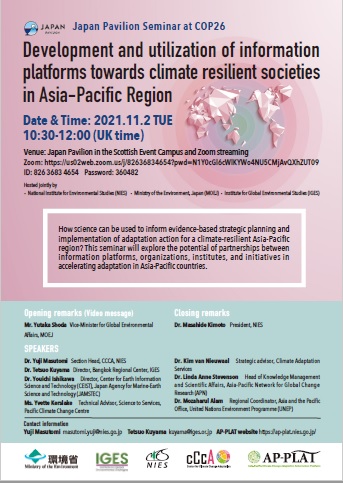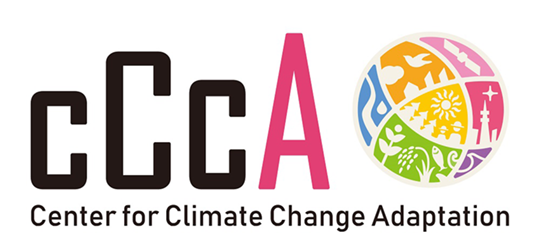Effective interaction among climate science, policy and action is key to building a climate resilient society. As mentioned in the Paris Agreement, climate-related capacity-development for developing countries should be accelerated to deal with the many challenges brought about by climate change. Considering these situations, the Asia-Pacific Climate Change Adaptation Information Platform (AP-PLAT) was launched aiming to provide an enabling environment for climate-risk informed decision-making and practical adaptation action through collaboration with partners including international organizations, universities, and research institutes.
This session will focus on sharing good practices and challenges in information platforms on how science can be used to inform evidence-based strategic planning and implementation of adaptation action for a climate-resilient Asia-Pacific region. This session will also explore the potential of partnerships between information platforms, organizations, institutes, and initiatives in accelerating adaptation in Asia-Pacific countries.
| Time (GMT) |
|
|
Chair: Dr. Yuji Masutomi, NIES |
| 10:30–10:35 |
Opening remarks (Video message)
Mr. Yutaka Shoda
Vice-Minister for Global Environmental Affairs, Ministry of the Environment, Japan
|
| 10:35–11:20 |
Activities for climate resilient societies in the Asia-Pacific regions
Each speaker will introduce their activities including background, approaches, outcomes, lessons, needs and challenges for developing climate-resilient societies especially in the Asia-Pacific region (5 mins, 5 slides). Participants will share their views on how to deliver scientific information to communities through information platforms.
Introduction of Asia-Pacific Climate Change Adaptation Information Platform (AP-PLAT)
Dr. Yuji Masutomi
Section head, Center for Climate Change Adaptation, National Institute for Environmental Studies (NIES), Japan
Capacity development through AP-PLAT
Dr. Tetsuo Kuyama
Director, Bangkok Regional Center, Institute for Global Environmental Studies (IGES), Japan
Introduction of Data Integration and Analysis System (DIAS)
Dr. Youichi Ishikawa
Director, Center for Earth Information Science and Technology (CEIST), Japan Agency for Marine-Earth Science and Technology (JAMSTEC)
Activities of Pacific Climate Change Centre (PCCC) and challenges in Pacific countries
Ms. Yvette Kerslake
Technical Advisor, Science to Services, Pacific Climate Change Centre (PCCC)
Outcomes of Knowledge Exchange between Climate Change Adaptation Platforms (KE4CAP)
Dr. Kim van Nieuwaal
Strategic advisor, Climate Adaptation Services
APN’s role in bridging science-stakeholder communities for a climate-resilient Asia-Pacific region
Dr. Linda Anne Stevenson
Head of Knowledge Management and Scientific Affairs, Asia-Pacific Network for Global Change Research (APN)
Activities of APAN and UNEP and outcomes of 7th APAN forum
Dr. Mozaharul Alam
Regional Coordinator, Asia and the Pacific Office, United Nations Environment Programme (UNEP)
|
| 11:20–11:55 |
Panel discussion with audience
Moderator: Dr. Linda Anne Stevenson, APN
By summarizing the presentations from each panelist, we will first share where we have reached today towards climate-resilient societies. To maximize the potential of information platforms, we will then discuss what is still lacking in information platforms for bridging science and stakeholder communities, the next steps needed, and explore ways to achieve our final goal of enabling climate-resilience societies. More concrete key questions that are to be addressed are:
- What gaps are there between stakeholders and science communities? How can information platforms fill these gaps?
- What are the most important features of information platforms that link science with stakeholder communities?
- What kinds of collaboration and partnerships are needed among information platforms, organizations, institutes and universities that can accelerate the realization of climate-resilient societies?
The panelists will address one of the above questions. In addition, we will receive several questions and suggestions from the floor in person and audience on chat in Zoom.
|
| 11:55 –12:00 |
Closing remarks
Dr. Masahide Kimoto
President, National Institute for Environmental Studies (NIES), Japan
|







